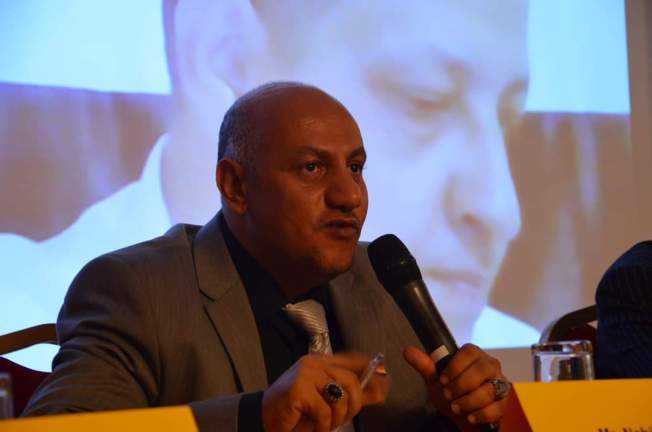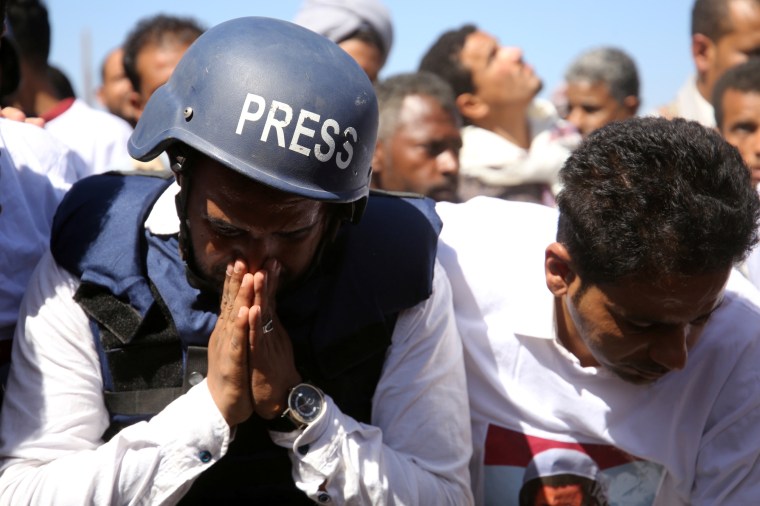March 2018 was a low point for Akhbar al-Youm, an independent daily newspaper in Yemen. Three weeks after the newspaper’s Aden office was set ablaze by unidentified arsonists, seven of its employees were abducted for a month by forces under the secessionist Southern Transitional Council, which controls the southern port city. The attacks forced the publication to relocate from Aden to Yemeni government-controlled Ma’rib, in the west, where it continued to publish.
Three years later, Akhbar al-Youm’s main problems are financial, Saif al-Haderi, president of the Shomou Foundation, the newspaper’s parent organization, told CPJ via email. Banned from distribution in areas controlled by the Southern Transitional Council and by Ansar Allah, also known as the Houthis, which al-Haderi said seized Akhbar al-Youm’s office in Sanaa, in the west, in 2014, the newspaper cannot sell enough subscriptions to stay afloat. Many of its journalists have left the industry altogether, he said.
Instead of closure by fire or capture, Akhbar al-Youm may shutter due to lack of funds.
Thus is the story of journalism in Yemen — squeezed from region to region by warring forces, journalists who do find a modicum of stability say they are at the end of their rope as they struggle to survive in a country beset by financial and humanitarian crisis. For many journalists, the only viable option is exile, a choice that comes with its own set of challenges.
“You could describe working as a journalist in Yemen as an adventure,” al-Haderi said. “The price one pays could be their life.”
Yemen’s journalists have documented their country’s dramatic arc over the last decade since the Arab Spring, which saw former President Ali Abdullah Saleh ousted in 2012, followed by the Houthi takeover of large swaths of the country two years later, a Saudi military intervention on behalf of the Yemeni government in 2015, and the rise of the UAE-backed Southern Transitional Council, whose forces seized control of Aden in 2020. With various parts of the country controlled by the warring groups — all of which are vying to expand their reach — Yemeni journalists say they are targeted by all sides.
The Houthis have assaulted, detained, and threatened journalists in the areas under their control and killed several with mortar and missile fire. The group sentenced four journalists to death and have held them for nearly six years in deplorable conditions. The Yemeni government has also harassed and detained journalists. The Southern Transitional Council has held journalists for months at a time. And in Hadramout, in eastern Yemen, local authorities are cracking down on the press through arrests and outright demands for censorship.
CPJ emailed Mohammad Abdulsalam, spokesman for Ansar Allah, but did not receive a response. Abdulbaset al-Qaedy, a spokesperson for the Yemeni government, told CPJ via messaging app that press freedom violations occurred in areas under government control, but did not acknowledge that the government perpetrated them. Southern Transitional Council spokesperson Mansour Saleh told CPJ via messaging app that journalists and media outlets operate freely in Aden, calling reports that the council had arrested or threatened journalists part of a “wide political campaign” against the group.
“The conflicting sides still see the media as opponents or enemies, and so there’s no ideal example of a safe area,” Saeed Thabit Saeed, Yemen bureau chief of the Qatar-based broadcaster Al-Jazeera, told CPJ via messaging app.
Yemeni government authorities shuttered the channel’s bureau in Taiz, in south-central Yemen, in January 2018 claiming its coverage aimed to divide the government and the Saudi-led coalition that supports it, as CPJ documented at the time, and subsequently barred the channel from operating in territory under its control. But politics recently intervened in the channel’s favor: Saeed told CPJ that the Yemeni Ministry of Information renewed its permit after the Yemeni government restored ties with Qatar in March 2021. Now Al-Jazeera operates in government-controlled Taiz and Ma’rib, albeit in “difficult circumstances and unsafe conditions,” said Saeed. Taiz is close to the front lines of fighting between Yemeni government and Houthi forces, and the Houthis are trying to retake Ma’rib, according to news reports.
Another outlet, independent satellite station Belqees TV, faced so much trouble with the Houthis that it relocated its main operations to Istanbul in 2015, a month after Houthi forces stormed its offices in Sanaa, according to news reports. That same year, Belqees journalist Abdullah Qabil was kidnapped by militiamen thought to be affiliated with the Houthis and the group’s allies, only to die days later in an airstrike by the Saudi-led coalition, as CPJ documented.
In an email to CPJ, Belqees general manager Ahmed al-Zurqa said that the Houthi-controlled areas remain the most dangerous for Yemeni journalists, citing the group’s ongoing detention of journalists and effective silencing of all independent or opposition media outlets. “The practice of journalism in Houthi-controlled areas is considered a punishable offense,” al-Zurqa told CPJ, calling the events of recent years a “slow death” for the industry.
The Southern Transitional Council has also caused problems for Belqees. Ultimately, the outlet shuttered its Aden office too after threats and harassment from the group, al-Zurqa told CPJ. Three other Belqees journalists have also been killed: two by crossfire allegedly by the Houthis, and one in an unclaimed attack on an airport.
“Belqees TV pays a heavy price because of our lack of political affiliation and our attempt to work in a professional manner; as a result, the channel and its reporters are targeted by all sides in the conflict,” al-Zurqa said.
Beyond the headline-grabbing attacks, the deteriorating economic and humanitarian situation makes the everyday logistics of reporting and filing stories difficult, and the simple economics of making a living as a journalist or surviving as an outlet next to impossible, journalists in Yemen told CPJ. Belqees still has journalists on the ground, who must navigate road closures, shifting frontlines, and more to report the news, said al-Zurqa.
“There are still challenges, related to the difficulties of doing field work in Yemen, such as with moving crews in the field, sending materials and reports, and sometimes with the network outages in Yemen,” he said.
Exiled Yemeni journalists struggle to cover the country they left
Given the myriad challenges, some journalists and press freedom activists have made the difficult choice of leaving Yemen to attempt to report on the country from exile. That includes Nabil Alosaidi, who helps run the Yemen Journalists Syndicate from his adopted home of Switzerland. Alsoaidi previously lived in Sanaa, and said his daily gatherings of journalists, intellectuals, and politicians caught the Houthis’ attention after they overran the city. He said he stopped the meetings under Houthi pressure, but that the threats continued — he believes his affiliation with the syndicate, which is linked to the Yemeni government, his previous work with the Saudi ministry of media, and his former position as director of the Saudi newspaper Okaz’s Yemen office made him a target.

“Asylum is hard on a journalist whose homeland lives in his heart.” — Nabil Alosaidi
(Photo by Mohammed Saif)
On April 23, 2015, Houthi forces came to his home, intent, he believes, on killing him. But he wasn’t there, having escaped after a friend warned him that gunmen had kidnapped a colleague and were on their way to his house next. “I was able to escape from their grip only half an hour before the gunmen came to my home,” he told CPJ via messaging app.
Alosaidi said he spent the next several months moving from city to city in Yemen before escaping to Saudi Arabia in October 2015. In December 2015, he went to Geneva with other media members accompanying the Yemeni government delegation to peace negotiations, where he ultimately stayed and sought political asylum.
Alosaidi said he is still waiting for the Swiss government’s decision on granting him asylum, and bearing the burden of being far from his family, whom he has not seen in six years. “Asylum is hard on a journalist whose homeland lives in his heart,” Alosaidi told CPJ. “European countries deal with you only as an asylum seeker, not as a journalist deserving of resources.”
“For those who are able to reach Europe, they face many difficulties, in terms of the language, adapting to a new society, finding decent work, and integrating, as well as the difficulty in finding journalistic and human rights work in [European] countries, because they deal with us as refugees,” Alosaidi said.
Being abroad makes it difficult to continue covering Yemen, he said, as he has been cut off from his contacts on the ground. But he continues to advocate for journalists in his home country. “The safety and freedom make us steadfast in continuing our march, and at the same time we continue to contribute to the record of Yemeni journalists’ voices, and the violations that they are exposed to, and we defend freedom of the press and the humanity of Yemenis to the best of our ability,” he said.
Istanbul has also become a landing pad for Yemeni journalists in exile. Youssef Ajlan, who was detained and told CPJ he was brutally tortured by the Houthis for more than a year, said via messaging app he was currently based in Istanbul and working for the private Yemeni channel Yemen Shabab after leaving the country in 2018. “There are three Yemen-specific channels operating out of Istanbul, employing many journalists and media workers,” Ajlan said.
Al-Zurqa, Belqees TV’s general manager, confirmed Ajlan’s description of the Yemeni exile media landscape in Turkey, telling CPJ that what he described as three “opposition satellite channels” focusing only on Yemen are operating there. “There’s a good deal of space for these channels to operate freely, as they’re devoted to Yemeni affairs, and there’s no interference from the Turkish side on the channels’ content,” al-Zurqa said via email.
Turkey’s emergence as a space of relative freedom and safety for Yemeni journalists is ironic. The country has consistently ranked among the top jailers of journalists in recent years, according to CPJ research, and Turkish authorities’ attacks on journalists extend outside the country. Foreign journalists in Turkey still face the risk of targeted killings and Turkish authorities sometimes direct foreign outlets to adjust their coverage depending on relations with other regional powers, as happened this year with Istanbul-based Egyptian outlets, the AP reported.
CPJ emailed the Turkish government’s directorate of communications for comment on restrictions on and residency requirements for international journalists in Turkey but did not immediately receive a response.
For Ajlan, who told CPJ that he is living in Turkey on a tourist visa that can be renewed annually, life as an exiled Yemeni journalist in the country is tenuous at best. “With regard to journalists here in Turkey, their situation is unstable since they don’t have any work residency permits, and the government’s decisions in Turkey could change any day and the tourist residency permits could be canceled,” he said.
Al-Zurqa did not describe any difficulties in working from Turkey, emphasizing that it was the best option for many Yemeni journalists. Asked whether there is a future for journalism in the country he left behind, he said “if a safe environment were available in Yemen, all journalists and media outlets would return.”
But Saeed, of Al-Jazeera, told CPJ that a safe environment depends on more than a cessation of conflict.
“I’m not optimistic about journalism [in Yemen] for the foreseeable future,” he said, noting that political groups view journalists as partisan actors. “They will have security issues in the future, even if a fragile peace is reached.”
Editor’s note: The location of Taiz has been corrected in the 10th paragraph.
